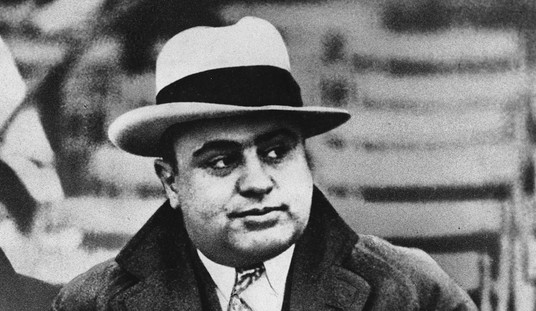Generally, I’m not one to hammer on outlets as a whole, although some — Salon comes to mind — seem to use trolling people with ridiculous premises as their entire marketing strategy. Vox has its moments like this, although they also recently hired the estimable Jon Allen as a political editor to shore up their credibility. However, it’s essays like today’s “3 Reasons the American Revolution was a Mistake” two days before Independence Day that provide most of Vox’s reputation for intellectual heft. Well, it’s those and that West Bank to Gaza Bridge that inspired Sonny Bunch to offer “The Year in Voxfails” at the Free Beacon, along with the supposedly longest winter night ever that wasn’t.
At least this essay from Dylan Matthews is more of an opinion piece, and Dylan’s entitled to his opinions and to write about them, even if they are more or less spun out of pure fantasy. That’s what this is, of course — a series of improbable what-ifs that ignore historical realities and contexts for simplistic assumptions, built around a trollish central argument guaranteed to get clicks. It’s practically old-school undergrad blogging at its most pure, and only needs some Rule 5 imagery to complete the experience.
According to Matthews, a British colonial system would have produced fairer treatment for Native Americans, even though the British and French pitted them against each other mercilessly prior to the American Revolution. If the British stuck around, then that would have continued and gotten worse after the French Revolution and the Napoleonic era as the British tried to eat into French territory. It might be true that we wouldn’t have pursued Native American land very far past the Ohio Valley, but only because the French held the Midwest all the way down to the Gulf of Mexico. Had the British been left in charge here rather than the Americans, the Louisiana Purchase likely would never have taken place, as the French wouldn’t have sold it to their enemies in England. That means that the US would only exist to the east of the Mississippi, which hardly sounds preferable to today, or the colonists would have had to fight more wars with France to gain the Midwest. And that would still leave us with Mexico owning most of the West Coast.
Matthews also argues that British control would have ended slavery sooner, apparently because the British managed to end the slave trade earlier than we did:
The main reason the revolution was a mistake is that the British Empire, in all likelihood, would have abolished slavery earlier than the US did, and with less bloodshed.
Abolition in most of the British Empire occurred in 1834, following the passage of the Slavery Abolition Act. That left out India, but slavery was banned there too in 1843. In England itself, slavery was illegal at least going back to 1772. That’s decades earlier than the United States.
Can anyone spot the fallacy in this argument? In 1772, the colonies still belonged to the Crown … and it didn’t end slavery here at all. It didn’t impact the British slave trade much either; it took William Wilberforce more than three decades to end the British domination of the slave trade in 1807. Furthermore, the colonies here were not a conquered people but autonomous enough that the British abolition wouldn’t have impacted the southern colonies, not for a very long time. The outposts where the British managed to dictate emancipation didn’t have home rule in the same sense as the American colonies had it — nor would the South have just acquiesced on the question, as the Northern colonies found out to their frustration. We just would have had a civil war a few years earlier, and probably in a far more messy form, with an almost-certain political partition typical in former British Empire outposts in the post-colonial era.
Finally, Matthews insists that we would have protected ourselves better from dictatorship:
Honestly, I think earlier abolition alone is enough to make the case against the revolution, and it combined with less-horrible treatment of American Indians is more than enough. But it’s worth taking a second to praise a less important but still significant consequence of the US sticking with Britain: we would’ve, in all likelihood, become a parliamentary democracy rather than a presidential one.
And parliamentary democracies are a lot, lot better than presidential ones. They’re significantly less likely to collapse into dictatorship because they don’t lead to irresolvable conflicts between, say, the president and the legislature. They lead to much less gridlock.
Say, perhaps Matthews might want to look at 17th-century English history for an object lesson on that score. Oliver Cromwell became a de facto dictator by leveraging the power of Parliament against the King, which committed regicide and made Cromwell the Protector. Even if Matthews isn’t terribly familiar with that history, the founders of the American system certainly were. When drafting the Constitution, they ensured that the executive and legislative branches had co-equal power, with checks and balances to ensure that neither branch produced a dictatorship.
For that matter, Matthews might want to study the history of 20th-century parliamentary systems, especially one in particular — the Weimar Republic. Parliamentary systems provide no particular protection against dictatorships, and the instability of multi-party politics can actually create more of those dangers. But here’s a better question: why does Matthews want a parliamentary system and its supposed bulwark against dictatorships? Ironically, it’s because he likes their unchecked power. No, really:
In the US, activists wanting to put a price on carbon emissions spent years trying to put together a coalition to make it happen, mobilizing sympathetic businesses and philanthropists and attempting to make bipartisan coalition — and they still failed to pass cap and trade, after millions of dollars and man hours. In the UK, the Conservative government decided it wanted a carbon tax. So there was a carbon tax. Just like that. Passing big, necessary legislation — in this case, legislation that’s literally necessary to save the planet — is a whole lot easier with parliaments than presidential systems.
On second thought, skip the history lessons, and study the use of irony instead.
Update: Here’s a fairly decent overview of the French and Indian War that preceded the American Revolution. Note the divisions here:
The French and Indian War resulted from ongoing frontier tensions in North America as both French and British imperial officials and colonists sought to extend each country’s sphere of influence in frontier regions. In North America, the war pitted France, French colonists, and their Native allies against Great Britain, the Anglo-American colonists, and the Iroquois Confederacy, which controlled most of upstate New York and parts of northern Pennsylvania. In 1753, prior to the outbreak of hostilities, Great Britain controlled the 13 colonies up to the Appalachian Mountains, but beyond lay New France, a very large, sparsely settled colony that stretched from Louisiana through the Mississippi Valley and Great Lakes to Canada. (See Incidents Leading up to the French and Indian War and Albany Plan)
The border between French and British possessions was not well defined, and one disputed territory was the upper Ohio River valley. The French had constructed a number of forts in this region in an attempt to strengthen their claim on the territory. British colonial forces, led by Lieutenant Colonel George Washington, attempted to expel the French in 1754, but were outnumbered and defeated by the French. When news of Washington’s failure reached British Prime Minister Thomas Pelham-Holles, Duke of Newcastle, he called for a quick undeclared retaliatory strike. However, his adversaries in the Cabinet outmaneuvered him by making the plans public, thus alerting the French Government and escalating a distant frontier skirmish into a full-scale war.
The 1763 treaty ending the French and Indian War gave the British all the land east of the Mississippi, but left the French on the west side of the river. Had the American Revolution not happened, eventually this would have become another battlefield in the Napoleonic Wars, with the Native American tribes split up and played against each other in exactly the same manner.
Update: Also, Pontiac’s Rebellion immediately after the French and Indian War was prompted in part by harsh British treatment of Native American tribes, a point I had long forgotten. The three-year war did result in the British halting westward expansion by the colonials, but that was a temporary policy even in theory, and in reality didn’t last long at all.
Update: After the French and Indian War, the territory west of the Mississippi passed to the control of Spain, but was mainly settled (very sparsely) by the French. Napoleon reacquired it in 1800. Thanks to Twitter user Socrates for the reminder/correction — but it still leaves everything west of the Mississippi in the hands of a foreign power unlikely to sell it to the British.
Update: One last point on the transferability of the parliamentary system: none of the colonies used it during the period of British rule. They all had governors appointed by the crown, and assemblies elected by the colonists, with a clearly separate executive and legislative branches, although the latter at first tended to have little authority. In some cases, this form of government developed from the corporate-charter beginnings of the colonies. That history no doubt informed the design of the US federal system, which we should note has proven rather resistant to dictatorship as well. Perhaps without the revolution the colonies would have converted to a parliamentary system at some point, but it’s certainly worth noting that it hadn’t happened after more than a century of British rule in any of the 13 colonies by the time of the revolution, nor did it happen in any of them during the revolution or the Articles of Confederacy era.








Join the conversation as a VIP Member